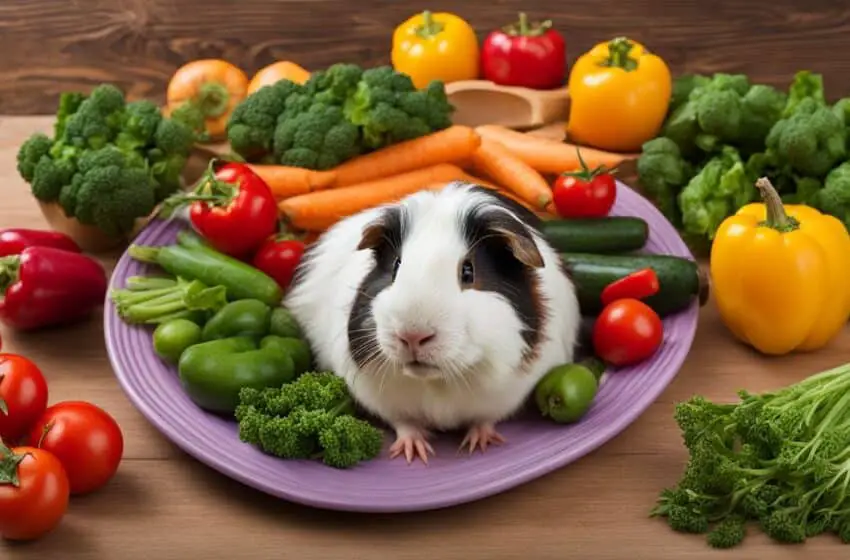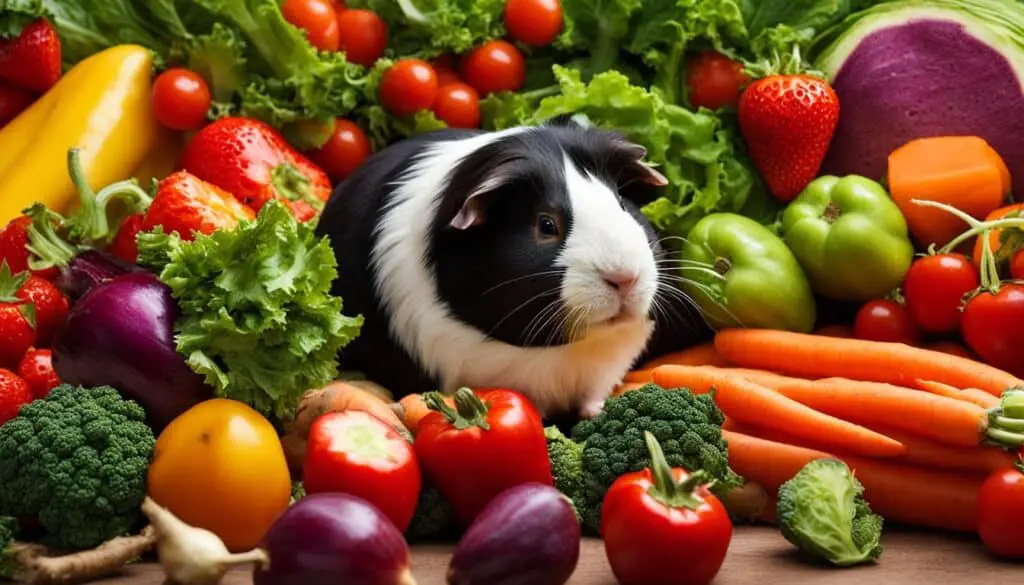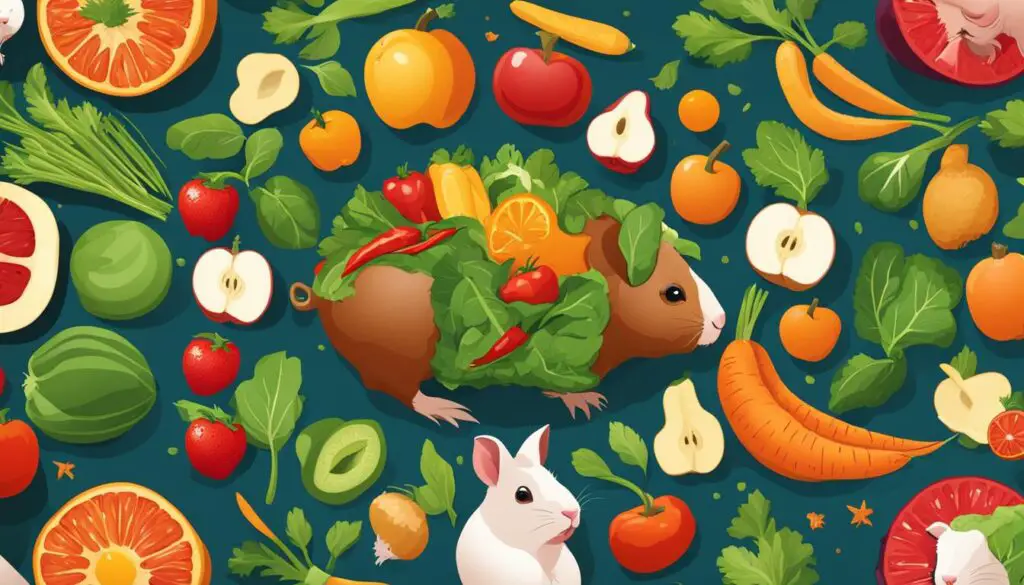Optimizing Nutrition for Your Guinea Pig: Top Advice

As a proud guinea pig owner, I understand the importance of providing my furry friend with a healthy and balanced diet. A well-rounded nutrition plan is crucial for their overall health and well-being. In this article, I will share the top advice for optimizing the nutrition of your guinea pig, ensuring they thrive and live their best lives.
Key Takeaways:
- Guinea pigs require a healthy diet to support their immune system and maintain a healthy weight.
- A balanced diet includes hay, fresh vegetables, and guinea pig pellets.
- Fiber is essential for digestion and preventing common health issues.
- Ensure an adequate intake of essential vitamins and minerals, especially vitamin C.
- Consult with a veterinarian for personalized nutrition advice.
Benefits of a Healthy Diet for Guinea Pigs
A healthy diet plays a crucial role in the overall health and longevity of your guinea pig. Providing them with a nutritious diet ensures that they receive the essential nutrients needed to support their immune system, promote digestion, and maintain a healthy weight. By feeding your guinea pig a balanced and varied diet, you can ensure they get all the necessary vitamins, minerals, and fiber they need to thrive.
One of the key benefits of a healthy diet for guinea pigs is the prevention of common health issues. Dental problems are a frequent concern in guinea pigs, but a diet rich in fibrous hay and fresh vegetables helps maintain good dental health and wear down their teeth naturally. Additionally, a well-balanced diet helps prevent obesity, a condition that can lead to various health complications.
A guinea pig’s diet should consist of three main components: hay, fresh vegetables, and guinea pig pellets. Hay provides essential fiber, promotes healthy digestion, and helps maintain the overall well-being of your furry friend. Fresh vegetables, such as leafy greens and bell peppers, provide important vitamins and minerals, including vitamin C, which is vital for guinea pigs as they cannot produce it on their own. Guinea pig pellets serve as a supplement, ensuring they receive a complete and balanced nutritional profile.
Introducing a variety of foods into your guinea pig’s diet is crucial to meet their nutritional needs. Offering a range of vegetables and fruits allows them to obtain different vitamins and minerals, promoting optimal health. However, it’s important to introduce new foods gradually and monitor your guinea pig for any signs of digestive upset.
By providing a healthy diet for your guinea pig, you are not only supporting their overall well-being but also preventing potential health issues. Remember to always consult with a veterinarian for personalized advice on the best diet for your individual guinea pig.

“A healthy diet is essential for guinea pigs, providing them with the necessary nutrients to thrive and preventing common health issues.”
Importance of Fiber in a Guinea Pig’s Diet
Fiber plays a vital role in maintaining the health and well-being of your guinea pig. It contributes to healthy digestion, prevents gastrointestinal issues like stasis, and aids in wearing down their teeth naturally. Ensuring an adequate intake of fiber is crucial for the overall well-being of your furry friend.
One of the best sources of fiber for guinea pigs is hay. It should be available to them at all times, as it not only provides the necessary fiber but also helps keep their teeth healthy and trim. Fresh vegetables like kale, spinach, and dandelion greens are also high in fiber and should be included in their diet.
By incorporating these high-fiber foods into your guinea pig’s diet, you can promote healthy digestion, prevent digestive issues, and support their overall well-being. Remember to introduce new foods gradually to avoid any digestive disturbances.
Providing your guinea pig with a diet rich in fiber is essential for their optimal health. It helps maintain their digestive system, prevents dental problems, and promotes their overall well-being. Make sure to offer a variety of high-fiber foods, such as hay and fresh vegetables, as part of their daily meals. This will ensure that your adorable furry friend stays happy and healthy.
Essential Vitamins and Minerals for Guinea Pigs
Guinea pigs rely on a variety of essential vitamins and minerals to maintain optimal health and well-being. One of the most vital nutrients for their diet is vitamin C. Unlike humans, guinea pigs cannot produce vitamin C on their own, making it crucial to include vitamin C-rich foods in their daily meals. Bell peppers and leafy greens, such as kale and spinach, are excellent sources of vitamin C that should be incorporated into their diet.
In addition to vitamin C, guinea pigs require minerals like calcium and potassium to support their bone health and ensure proper muscle function. Including a diverse range of vegetables and fruits in their diet helps ensure they receive the necessary vitamins and minerals for their overall well-being.
Here is a table that highlights some essential vitamins and minerals for guinea pigs:
| Vitamins | Minerals |
|---|---|
| Vitamin C | Calcium |
| Vitamin A | Potassium |
| Vitamin K | Phosphorus |
| Vitamin E | Magnesium |
| B Vitamins (B1, B2, B3, B6, B12) | Zinc |
By ensuring a balanced and varied diet that includes the necessary vitamins and minerals, you can help promote the health and longevity of your guinea pig. It is important to consult with a veterinarian for personalized advice on the specific dietary needs of your furry friend.

Conclusion
Optimizing the nutrition of your guinea pig is essential for their overall health and well-being. By following the advice provided in this article, you can ensure that your furry friend receives a healthy and balanced diet that meets their nutritional needs.
A key aspect of guinea pig nutrition is incorporating a variety of high-fiber foods into their diet. Hay should be available to them at all times as it provides the necessary fiber for healthy digestion and dental wear. Fresh vegetables like kale, spinach, and dandelion greens are also excellent sources of fiber and should be included in their diet.
In addition to fiber, guinea pigs require essential vitamins and minerals for optimal health. Vitamin C, which they cannot produce on their own, is particularly important. Bell peppers and leafy greens are rich in vitamin C and should be part of their diet. Adequate intake of minerals like calcium and potassium is also necessary for their bone strength and muscle function.
When introducing new foods, it is important to do so gradually to prevent digestive issues. Monitor your guinea pig’s health closely and consult with a veterinarian for personalized advice on the best diet for your furry friend. By providing a balanced and varied diet, along with unlimited access to hay and fresh water, you can ensure that your guinea pig enjoys a long, healthy, and happy life.
FAQ
What should be included in a guinea pig’s diet?
A guinea pig’s diet should include hay, fresh vegetables, and guinea pig pellets. It is important to provide a balanced diet that includes a variety of foods.
How much hay should I give my guinea pig?
Hay should be available to your guinea pig at all times. It is an essential source of fiber and helps maintain healthy digestion.
Do guinea pigs need vitamin C?
Yes, guinea pigs require vitamin C as they cannot produce it on their own. Foods rich in vitamin C, such as bell peppers and leafy greens, should be included in their diet.
Can guinea pigs eat fruits?
Yes, guinea pigs can eat fruits as part of a balanced diet. However, fruits should be given in moderation due to their high sugar content.
How should I introduce new foods to my guinea pig?
It is best to introduce new foods gradually to avoid digestive issues. Start by offering small amounts of the new food and monitor your guinea pig’s reaction.



